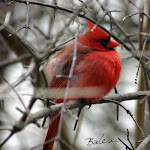•
 |
| Rose-breasted Grosbeak (Pheucticus ludovicianus) |
File this under "Good Fathers" as opposed to the "Bad Dads" that I blogged about two weeks ago.
Rose-breasted
grosbeaks are passing through the valley, visiting our birdfeeders. Tired from their long flight across the Gulf of Mexico, they pause to refuel on their way to their breeding grounds to the north and in the highest elevations of the Great Smokies and Cumberland Mountains of East Tennessee.
Their
name obviously comes from the red "bleeding" bib of the males. The
females are streaky brown but here's the odd thing. The exception to the
rule.
As
a general guideline in the bird world, if the male is a bright color and the female more
subdued, then she is camouflaged to sit on the eggs and he avoids the nest not wanting to
draw attention to the hidden clutch.
 |
| Coming soon! My new book. |
Perhaps I am being a bit anthropomorphic, but such concerns are becoming passé since there are clear connections between us and all the rest. The line between human nature and animal nature is proving to be artificial, i.e. man made, a way to separate ourselves from the natural world we feel too superior to be a part of, yet pride cometh before the fall. And in this case, the fall is inevitable.
Be that as it may, isn't the following a good description of proper fathering skills? And how many human fathers do you know that simply do much less and leave their young ones to fend for themselves.
Not the male grosbeaks.
They help feed the young after they hatch, after which, the mated pair often have a second brood. If so, mom builds the new nest while papa tends the young from the first brood preparing them for independence singing all the while.
That's a proud papa.
And his song? It's often described as robin-like but more intense.


































































2 comments:
I think the male grosbeak is taunting those male hummingbirds.
We see these birds once in a while as they migrate by. Beautiful and shrill song!
Post a Comment